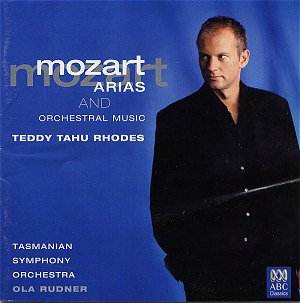Teddy Tahu Rhodes, a native of New Zealand, teams
with an Australian orchestra and Swedish conductor in this new
disc mixing Mozart opera arias with a few of his orchestral pieces.
This type of programming is not unusual and has the advantage
of enhanced variety. Of course, the main player is the vocal soloist
as attested to by the color photographs of Rhodes. There is a
small black and white photo of Rudner; he and Rhodes could easily
be mistaken for brothers.
In opera, an attractive voice is not usually
of prime importance. Through expressiveness, the singer must enter
the heart and soul of the character played, and this is the area
where the young Teddy Tahu Rhodes does not pass muster. He has
an eminently pleasant voice, but he consistently neglects to bring
his characters to life.
In "Le nozze di Figaro", both The Count
and Figaro are underhanded sexual schemers with sharp tongues
and a flair for bravado. The problem with Rhodes is that he does
not well express any sharpness of diction; his phrasing is too
rounded, and he sounds more like a crooner than schemer. Although
Ola Rudner is sufficiently sharp in his attacks, Rhodes refuses
to follow suit.
Mozart’s "Don Giovanni" revolves around
the familiar tale of Don Juan and his insatiable appetite for
sex with women. Eventually, this all-consuming pastime catches
up with him as he kills the father of one of his conquests only
to be dragged to Hell by the father’s stone statue. Appropriately,
the libretto was written by Lorenzo da Ponte who was also an extreme
womanizer who had a magnetic appeal to women even after all his
teeth were lost through medical ignorance. From my view, any man
without teeth who can still dazzle the women rates instant admiration.
Don Giovanni spends all his time in the hunt
and conquest of women regardless of their situation, facial features,
body shape or age. We could call him an ‘equal opportunity’ lover
who never allows any thoughts of morality to influence his actions.
In Track 5, Don Giovanni’s servant Leporello
parades the list of women his master has conquered which extends
to a grand total of 2,063 females. Clearly, this is a humorous
monologue although some might find it alarming. Rhodes sounds
rather flat, conveying neither humor nor alarm. As in the "Figaro"
arias, he is too smooth of tone and not sufficiently detailed.
On the plus side, the more poignant moments are sung very well;
when crooning is needed, Rhodes gives full measure. This also
applies to Track 7 where Don Giovanni serenades his next victim.
However, a really gorgeous voice is best for the Serenade, and
Rhodes does not possess one.
I don’t want to become redundant, so I will simply
report that Rhodes maintains the same regimen in the arias of
the two remaining operas. Just once, I wanted to hear Rhodes snarl,
but such displays are apparently not within him.
As I hinted at earlier, Ola Rudner is a splendid
conductor of Mozart’s music. The orchestral pieces are vivid and
robust which is more than I can say for Rhodes. Also, Rudner excellently
captures the stern and austere qualities of the Adagio and Fugue
in C minor. Sound quality is quite good, but I would have preferred
a less integrated soundstage.
When the purely orchestral music is more enjoyable
than the Mozart arias, you know that something is askew. As fine
as the orchestra might be, this is essentially a cameo disc for
Rhodes that stands or falls on his artistry. With less than sterling
characterization and only a mildly attractive voice, Rhodes can’t
possibly compete with the dozens of alternative singers on record
in these Mozart roles. When I am finished with the review, I am
going to spend a couple of hours listening to Walter Berry’s Mozart.
Berry, a superb singer and actor, reveals just what Teddy
Tahu Rhodes is missing. If Rhodes has a goal of being one of the
leading Mozart singers of our time, he will need to learn how
to better portray Mozart’s characters.
Don Satz
